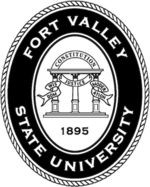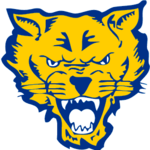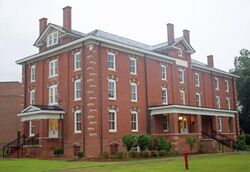Fort Valley State University
Topic: Organization
 From HandWiki - Reading time: 9 min
From HandWiki - Reading time: 9 min
 | |
Former name | Fort Valley High and Industrial School (1895–1939) Fort Valley State College (1939–1996) |
|---|---|
| Motto | Be Bold. Be Amazing. Be Prepared. |
| Type | Public land-grant historically black university |
| Established | 1895 |
Parent institution | University System of Georgia |
Academic affiliation | Space-grant |
| Endowment | $6.6 million [1] |
| President | Paul Jones |
Administrative staff | 400 |
| Students | 2,182 (Fall 2021)[2] |
| Location | Fort Valley, Georgia , U.S. [ ⚑ ] : 32°32′3.9″N 83°53′45.8″W / 32.534417°N 83.896056°W |
| Campus | 1,365 acres (5.52 km2) |
| |u}}rs | Royal blue and old gold |
| Nickname | Wildcats |
Sporting affiliations | NCAA Division II – SIAC |
| Website | www |
 | |
Fort Valley State University (FVSU, formerly Fort Valley State College and Fort Valley Normal and Industrial School) is a public land-grant historically black university in Fort Valley, Georgia. It is part of the University System of Georgia and a member-school of the Thurgood Marshall College Fund.
Fort Valley State University is the state's 1890 land-grant university and enrolls over 2,500 students. Approximately 90% of the student body is of African-American descent. The average age of undergraduates is 24 and the average age of graduate students is 33. Roughly one-third of the students live on the campus and 85% of the student body are full-time students. The university is located in the town of Fort Valley in Peach County, the original site of the state's peach industry. Its 1,365-acre (5.52 km2) main campus is Georgia's largest public university in area.
History
Fort Valley State University (formerly Fort Valley State College) began with the 1939 consolidation of the Fort Valley High and Industrial School (chartered in 1895) and the State Teachers and Agricultural College of Forsyth (founded in 1902).[3] The Fort Valley High and Industrial School, previously affiliated with the American Church Institute of the Protestant Episcopal Church, was transferred to state control and operation. Under the agreement, the work formerly carried on at the State Teachers and Agricultural College was consolidated with the work at Fort Valley High and Industrial School to form the Fort Valley State College.
In 1947 the state Board of Regents adopted a resolution moving the "land grant" designation from Savannah State College to Fort Valley State College. In response to the Regents' resolution, in 1949 the Georgia General Assembly officially designated the Fort Valley State College as the Land-Grant College for Negroes in Georgia. Public education was segregated at that time.
The school became Fort Valley State University, a state and land-grant university, in June 1996, and is the second largest land-grant institution.
Presidents
| Dr. Horace M. Bond (1939–1945) |
| Cornelius V. Troup (1945–1966) |
| W. W. E. Blanchet (1966–1973) |
| Cleveland W. Pettigrew (1973–1982) |
| Luther Burse (1983–1991) |
| Oscar L. Prater (1991–2000) |
| Kofi Lomotey (2001–2005) |
| Larry Rivers (2006–2013) |
| Ivelaw Griffith (2013-2014) |
| Paul Jones (2015–present) |
The president of Fort Valley State University is the chief executive officer of the university. Paul Jones has held the position since December 2015.
Academics
Fort Valley State University offers bachelor's degrees in more than 50 majors, as well as master's degrees in several fields of study. FVSU is accredited by the Commission on Colleges of the Southern Association of Colleges and Schools (SACS) to award associate, baccalaureate, master's and specialist degrees.
The university also offers the Cooperative Developmental Energy Program (CDEP) which provides an opportunity for qualified students to receive a STEM degree from FVSU and an engineering degree from the Georgia Institute of Technology, University of Texas at Austin, Pennsylvania State University, University of Arkansas at Fayetteville, or University of Texas at Rio Grande Valley.[4]
The university's honors program is a selective undergraduate program designed to cater to high-achieving students.[5]
Outreach services include Fort Valley State's Cooperative Extension Service Program, where extension service specialists operate in 42 Georgia counties, and the Pettigrew Conference Center, which hosts more than 500 courses and events for 51,000 patrons each year. In an effort to accommodate graduate and non-traditional students, external degree program courses are also being offered at off-campus sites in Macon, Cochran, Warner Robins and Dublin. The university offers online courses via WebCT, which allows students to pursue a number of majors and programs from home.
College of Arts and Sciences
The College of Arts and Sciences, the oldest and the largest college at FVSU, houses 12 academic units and offers nearly 80 percent of the courses taught at FVSU. The college services the University System of Georgia's Academic Core and provides 20 undergraduate major fields of study. The Department of Business Administration and Economics is the largest academic department in the College of Arts and Sciences, and is an accredited member of the Accreditation Council for Business Schools and Programs (ACBSP).
College of Education
The College of Education is an educator preparation program offering degrees in Middle Grades Education, undergraduate and graduate; Agriculture Education, undergraduate and post-baccalaureate; Early Childhood / Special Education undergraduate; School Counseling; Early Childhood / Special Education graduate; Health and Physical Education; Family and Consumer Sciences Education; and an MAT degree in the secondary teaching areas.
College of Agriculture, Family Sciences and Technology
The College of Agriculture, Home Economics & Allied Programs is ranked 25th nationally in the production of African American agriculturists and the university's leader in placing first-time applicants into medical, dental, veterinary and pharmacy schools and colleges since 2001. The college has laboratories in the state, and scientists are securing grant funds and conducting cutting-edge research.[6]
Campus


Pettigrew Center
Pettigrew Farm and Community Life Center is a conference, convention, and fine arts facility.
Anderson Museum and Welcome Center
The Anderson House is Fort Valley State University's oldest building and houses the Biggs Collection.
Anderson House
Anderson House was the residence of F.W. Gano, one of the university's founders. It is the oldest facility on campus. The exhibits and displays in the house come from the Biggs Collection of period furnishings, silver, glassware, china, quilts, linens and civil war memorabilia.
Student activities
FVSU students have many opportunities for extracurricular involvement at the university, including NCAA Division II intercollegiate athletics, The Blue Machine Marching Band, concert choir, Baptist Student Union Choir, forensics (intercollegiate speech and debate), and cheerleading. Overall, there are more than 70 clubs, social, and Greek organizations on campus.
Student media
FVSU has a radio station (WFVS-LP 104.3 FM) and a television station (FVSU TV), as well as a college newspaper, The Peachite.[7]
Athletics
Athletic opportunities include intramural sports and intercollegiate men's basketball, cross country, football, tennis, and track and field, and volleyball and women's basketball, cross country, softball, tennis, volleyball, and track and field. The school currently competes as a member of the Southern Intercollegiate Athletic Conference.
Alumni
| Name | Class year | Notability | Reference(s) |
|---|---|---|---|
| Eddie Anderson | 1986 | Former NFL safety for the Seattle Seahawks and Los Angeles/Oakland Raiders | [8] |
| John W. Blassingame | 1960 | Professor and Chair of African Studies at Yale University for 29 years | |
| Catherine Hardy Lavender | 1952 | Olympic sprinter, won a gold medal in 1952 in the 4 × 100 metres relay | |
| Nick Harper | 2001 | Former NFL cornerback for the Tennessee Titans and Indianapolis Colts | [9] |
| Robert J. Jones | 1973 | Chancellor at the University of Illinois at Urbana–Champaign | [10] |
| Marquette King | 2012 | Former NFL punter for the Oakland Raiders and Denver Broncos | |
| Greg Lloyd | 1987 | Former NFL Pro Bowl player for the Pittsburgh Steelers | [11] |
| Ricardo Lockette | Former NFL wide receiver for the Seattle Seahawks, San Francisco 49ers | ||
| Tyrone Poole | 1995 | First round pick by Carolina Panthers; earned two Super Bowl rings with the New England Patriots as starter on the 2003 and 2004 teams | |
| Trey Wolfe | 2014 | Former NFL cornerback; NCAA career leader interceptions per game (2013) | |
| Charles Robinson, Jr. | 1970 | President and CEO of Sadie G. Mays Health and Rehabilitation Center in Atlanta; first African American to become certified by the American College of Healthcare Administrators | |
| Calvin Smyre | 1970 | Elected to the Georgia House of Representatives in 1974 as its youngest member at age 26; current Executive Vice President of the $34 billion financial corporation Synovus Foundation | |
| Derrick Wimbush | Former NFL player | ||
| Rayfield Wright | 1967 | NFL Hall of Fame inductee | [12] |
| Peppi Zellner | Former NFL player |
References
- ↑ https://datausa.io/profile/university/fort-valley-state-university}
- ↑ https://www.fvsu.edu/wp-content/uploads/2020/03/Fact-Book-19-20.pdf [bare URL PDF]
- ↑ "New Georgia Encyclopedia: Fort Valley State University". 2012-10-11. http://www.georgiaencyclopedia.org/nge/Article.jsp?id=h-1424.
- ↑ "Dual Degree Programs". Fort Valley State University. https://www.fvsu.edu/dual-degree-programs/.
- ↑ "Honors Program" (in en-US). https://www.fvsu.edu/honors-program/.
- ↑ "Fort Valley State University". http://www.fvsu.edu/academics/college_of_agriculture.
- ↑ "FVSU Peachite". http://fvsupeachite.blogspot.com/.
- ↑ "Eddie Anderson". databaseFootball.com. databaseSports.com. http://www.databasefootball.com/players/playerpage.htm?ilkid=ANDEREDD02.
- ↑ "Nick Harper". databaseFootball.com. databaseSports.com. http://www.databasefootball.com/players/playerpage.htm?ilkid=HARPENIC01.
- ↑ "Data". www.uillinois.edu. https://www.uillinois.edu/common/pages/DisplayFile.aspx?itemId=469766.
- ↑ "Greg Lloyd". databaseFootball.com. databaseSports.com. http://www.databasefootball.com/players/playerpage.htm?ilkid=LLOYDGRE01.
- ↑ "Rayfield Wright". databaseFootball.com. databaseSports.com. http://www.databasefootball.com/players/playerpage.htm?ilkid=WRIGHRAY01.
External links
- Fort Valley State Athletics website
- "Fort Valley Music Festivals, 1938-1943", recordings and documents, American Memory, Library of Congress
 KSF
KSF